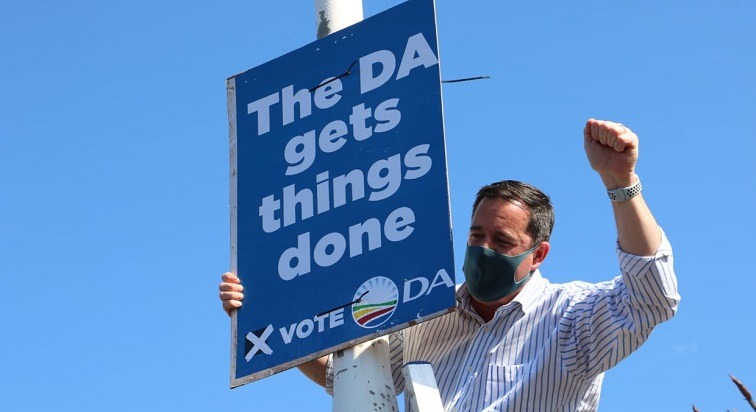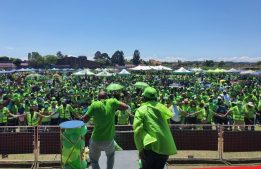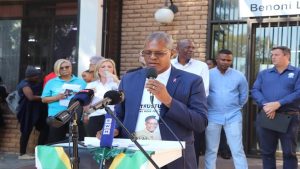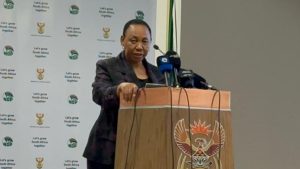The Democratic Alliance (DA) – South Africa’s official opposition – is set to endure another brutal drubbing in the 2024 national and provincial elections (NPE), if recent results are anything to go by.
The numbers do not look pretty.
And with every new entrant throwing their hat into the ring, the DA’s electoral problems are set to magnify in these elections.
Results between elections do not look good
In the 2019 general election, the party lost approximately 470 000 votes on the national ballot; and 391 000 votes on the provincial ballot.
This led to an overall 1.46 percentage point decrease from 2014; and a reduction of five seats in the National Assembly.
| GENERAL ELECTION 2014 – 2019 RESULTS | ||
| DA | 2014 | 2019 |
| General Election | 22.23% | 20.77% |
| Parliamentary Seats | 89 | 84 |
| 1.46 percentage point decrease; reduction in 5 seats between 2014 & 2019 | ||
The biggest losses were registered in Gauteng and the Western Cape.
In Gauteng, DA support was down 197 000 votes nationally and 163 000 votes on the provincial ballot. When it came to the Western Cape, support for the DA declined by 134 000 votes nationally and 119 000 on the provincial ballot.
The metros are to blame
However, if one digs a little deeper, pinpointing the DA’s electoral losses becomes even clearer. Most of the 2019 voter support losses emanated from the eight metropolitan municipalities, combined.
While the party won 709 735 more votes between 2009 and 2014 in the eight metros, the party lost nearly 341 000 votes in this space between 2014 and 2019.
And the top three losses for the DA in the metros in 2019 came from Cape Town (122 000), Johannesburg (67 000) and Tshwane (56 000).
For some context:
- Of the 2 945 829 votes the DA received nationally in 2009, 1 926 796 or 65.40% came from the 8 metros;
- Of the 4 091 584 votes the DA received nationally in 2014, 2 636 531 or 64.43% came from the 8 metros;
- and of the 3 621 188 votes the DA received nationally in 2019, 2 295 496 or 62.39% came from the 8 metros
Importantly, remember the DA is essentially a middle-class, urban party, with 90% support based in the large metros and towns.
So, the fact that their electoral weakening is happening in a once-thought-of safe space is eye-opening for the party’s executives and strategists.
The table below details the extensive voter support losses in the metros:
| DA PERFORMANCE IN SOUTH AFRICA’S 8 METROS 2009 – 2019 | ||||||
| 2009 | 2014 | 2019 | ||||
| VOTES | % | VOTES | % | VOTES | % | |
| METROS | ||||||
| Buffalo City | 35 339 | 11.3 | 55 991 | 18.8 | 45 191 | 16.6 |
| Cape Town | 688 420 | 50.9 | 859 134 | 59.3 | 736 282 | 53.0 |
| Johannesburg | 323 113 | 20.8 | 489 409 | 29.7 | 422 028 | 26.2 |
| Tshwane | 239 061 | 24.9 | 347 129 | 31.3 | 290 722 | 25.9 |
| Ekurhuleni | 226 839 | 20.4 | 319 125 | 26.8 | 274 987 | 23.1 |
| eThekwini | 237 464 | 18.4 | 325 787 | 22.9 | 318 519 | 23.2 |
| Mangaung | 48 518 | 16.6 | 63 623 | 21.5 | 56 330 | 20.6 |
| Nelson Mandela | 128 042 | 28.1 | 176 333 | 40.1 | 151 437 | 37.9 |
| TOTAL | 1 926 796 | 65.40% | 2 636 531 | 64.43% | 2 295 496 | 62.39% |
| DA won 709 735 more votes (26.91%) in all 8 metros between 2009 & 2014 | ||||||
| DA lost 341 035 (15%) votes in all 8 metros between 2014 & 2019 | ||||||
| Information sourced from the IEC election results dashboard | ||||||
So what could have happened?
When dissecting any election result, it is essential that voter turnout is factored in.
The 2019 poll witnessed the lowest voter turnout (66%) for a general election since 1994. Practically, this means that almost a million registered voters did not pitch on Election Day. Voter apathy and disillusionment with the political processes in the country could have been reasons why turnout was suppressed too; and why parties like the DA could have been negatively impacted.
But, things are not that cut and dry in electoral politics.
Other factors that could have harmed the DA electoral chances in 2019 include:
- Policy flip-flops on BEE, affirmative action, diversity and the race question;
- Helen Zille’s colonialism tweets; and the inaction to rein her in;
- Resignation of DA policy head a few months before 2019 election;
- Raft of Black leaders abandoning the party for other parties;
- Handling of the Patricia De Lille matter;
- Removal of Jacob Zuma as Head of State; and the subsequent installation of Cyril Ramaphosa first as ANC President and then South African President;
Where did the votes go, if not to the DA?
While these factors could have had a huge effect on the DA’s final vote tally in the 2019 general election, the raw, hard voter data tell a story of a party that perhaps had moved too much to the left to attract Black voters. In doing so, a core constituency was abandoned.
Enter the Freedom Front Plus (FF+) on cue.
The party lapped up those conservative voters in the DA that maybe felt the party no longer catered for its needs and aspirations in its quest for more Black African voters.
The Freedom Front Plus needed to do well in just three metros to boost their electoral fortunes, namely Cape Town, Johannesburg and Tshwane. In Cape Town, the FF+ increased their vote shares by 81% or 20 000 votes. In Johannesburg, the party saw its vote share rise by 69.71% or approximately 14 000 votes.
But the biggest win for the FF+ came in Tshwane with 51 000 more votes than in 2014, a 66.17% increase. Maybe this is why the DA chose to launch its 2024 election manifesto here. It needs to be seen. It needs to be visible on the ground.
Additionally, the DA is not known for its subtlety in handling internal divisions. The very public display of how former Cape Town mayor, Patricia De Lille was forced to resign and form her own party, GOOD, revealed another side to the DA. This dimension did not sit well with mainly Coloured voters in the Western Cape. This is why voters rushed to De Lille’s side, giving her GOOD party approximately 41 000 votes, notably in just three metros (Cape Town, Johannesburg and Tshwane).
Combined, the FF+ and GOOD won an additional 127 299 votes between 2014 and 2019 in Cape Town, Johannesburg and Tshwane.
This is 37% of the total metro loss of 341 000 ceded to other political parties.
As a caveat, the Patriotic Alliance’s (PA) 2019 vote tallies were looked at. Minimal damage was effected on the DA from this entity.
Expect the DA to bleed more support in the 2024 general election
While the PA posed no real threat to the DA in the 2019 general election, the 2021 Local Government Elections (LGE) illustrate an uglier picture for the party’s fortunes in the metros.
Between the 2016 and 2021 municipal polls, the DA lost in a combination of 1.6 million votes in just four metros, namely Johannesburg, Tshwane, Ekurhuleni and Cape Town.
Remarkably, just over 49% of this support (812 000 votes) gravitated towards just four other parties: the Patriotic Alliance, Freedom Front Plus, Action SA and GOOD.
The table details exactly where the DA’s threats are likely to come from in the 2024 general election:
| PATRIOTIC ALLIANCE + ACTION SA + GOOD + FF+ | |||
| PARTY | 2016 LGE | 2021 LGE | DIFFERENCE |
| JOHANNESBURG | |||
| DA | 964 855 | 482 653 | (482 202) |
| PA | 3835 | 54 176 | +50 341 |
| FF+ | 8128 | 24 671 | +16 543 |
| ACTION SA | – | 296 345 | +296 345 |
| GOOD | – | 6773 | +6773 |
| 370 000 votes for PA, ACTION SA, GOOD & FF+ | |||
| TSHWANE | |||
| DA | 762 190 | 431 042 | (331 148) |
| PA | 1202 | 6744 | +5542 |
| FF+ | 35 210 | 105 964 | +70 754 |
| ACTION SA | – | 116 214 | +116 214 |
| GOOD | – | 2196 | +2196 |
| 194 706 votes for PA, ACTION SA, GOOD & FF+ | |||
| EKURHULENI | |||
| DA | 614 373 | 385 044 | (229 329) |
| PA | 4771 | 25 154 | +20 383 |
| FF+ | 16 050 | 44 668 | +28 618 |
| ACTION SA | – | 88 484 | +88 484 |
| GOOD | – | – | |
| 137 485 votes for PA, ACTION SA & FF+ | |||
| CAPE TOWN | |||
| DA | 1 664 514 | 1 062 086 | (602 428) |
| PA | 4959 | 27 069 | +22 110 |
| FF+ | 10 284 | 28 850 | +18 566 |
| ACTION SA | – | – | – |
| GOOD | – | 69 502 | +69 502 |
| 110 178 votes for PA, GOOD & FF+ | |||
| INFORMATION SOURCED FROM THE IEC ELECTION RESULTS DASHBOARD | |||
While some may argue that the results of a local election cannot be compared to the outcomes of a national and provincial election, this author begs to differ.
Like by-elections, local municipal polls serve as a resourceful indicator of voter sentiment; and a harbinger of electoral fortunes for political parties. It points to pressure points within a party’s strategy: what is being done right, what needs fine-tuning; and how best can those weak pressure points be mitigated against.
If the DA wants to arrest its rapid decline in Gauteng’s Johannesburg, Tshwane, Ekurhuleni and the Western Cape’s Cape Town, something must be done urgently. Strategy in these places needs to be relooked at to ensure the bleeding of support is minimized. Parties like Action SA, GOOD, the Patriotic Alliance and the Freedom Front Plus have demonstrated that they are fishing in the same electoral pool as the DA. Deep introspection is thus needed to thwart the assaults from these four.






